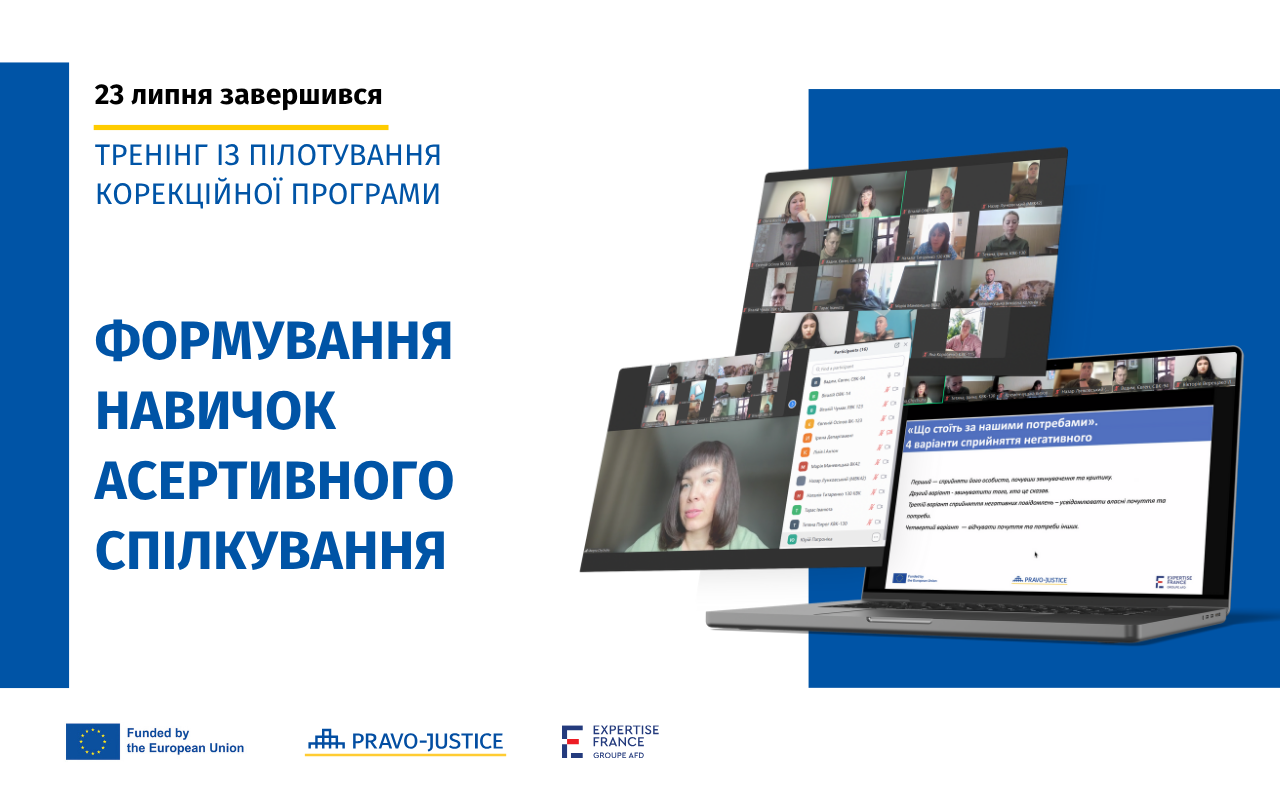EU Project Pravo-Justice Conducted Training on Piloting the Corrective Programme "Developing Assertive Communication Skills"

On 21-23 July, EU Project Pravo-Justice, at the request of the Department for the Execution of Criminal Sentences of the Ministry of Justice of Ukraine, conducted a training workshop on piloting the correctional programme "Developing Assertive Communication Skills". Nineteen participants (psychologists, heads of departments of social, educational work and psychological work, pre-release inspectors) from seven correctional colonies took part in the event, namely from Manevychi Correctional Colony (No. 42), Synelnykiv Correctional Colony (No. 94), Odesa Correctional Colony (No. 14), Lityn Correctional Colony (No. 123), Kaharlyk Correctional Colony (No. 115), Konotop Correctional Colony (No. 130), and Kremenchuk Correctional Colony.
“Piloting this correctional program is an important step toward systematic preparatory training for convicts re-entering society. We really hope this program will succeed because assertive communication is not just about knowing how to communicate or expressing one’s thoughts. It is about building relationships without aggression or subordination and defending personal boundaries while respecting the rights of others. People who have found themselves behind bars often lack these skills, and as a result they end up in conflict situations or break the law again,” said Valerii Kalivoshko, Head of the Department for Resocialisation and Social Rehabilitation at the Department for the Execution of Criminal Sentences.
Olena Kochura, Key Expert on Reforming the Penitentiary System and Probation at EU Project Pravo-Justice, stated that while serving their sentences, convicts can utilise assertive communication skills to interact more effectively with one another, avoid conflicts, and establish constructive communication with prison staff. After release, these skills will serve as a foundation for reintegration into the community, looking for work, and rebuilding relationships with family members.
“Developing such skills is also useful for prison staff. It improves communication with convicts, making it more professional and safer, and reduces tension in their interactions. We hope that this approach will become a best practice in working with convicts and will be rolled out to all institutions,” said Olena Kochura.
Maryna Chychuha, national expert at EU Project Pravo-Justice, who developed this correctional programme, explained that this training is not just an overview of the correctional programme, but comprehensive professional training for psychologists working with convicts.
Participants were learning to grasp the concept of assertiveness and distinguish between different communication styles, such as passive, aggressive, manipulative, and assertive. They practised I-messages to help prisoners express their needs and emotions without being aggressive or manipulative. Participants also learned about the basic principles of the cognitive behavioural approach, methods for addressing destructive beliefs, acceptance and commitment therapy, and approaches aimed at developing empathy,” said Maryna Chychuha. According to her, it is not only about new communication skills, but also about being able to gain a deeper understanding of oneself, one’s emotions and needs.
After the training, a six-month pilot programme will kick off in the colonies taking part in this initiative.
Reference
The correctional programme “Developing Assertive Communication Skills” is based on cognitive behavioural therapy, acceptance and commitment therapy, and mindfulness practices. Its methods are science-based and have been effectively applied in therapy. The programme is designed for adult and juvenile convicts, men and women serving criminal sentences in correctional facilities.